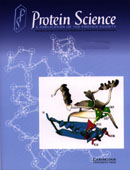Crossref Citations
This article has been cited by the following publications. This list is generated based on data provided by
Crossref.
Cheng, Jya-Wei
Tzeng, Shiou-Ru
and
Pai, Ming-Tao
2001.
Peptides: The Wave of the Future.
p.
695.
Pai, Ming-Tao
Huang, Kuo-Chun
Tzeng, Shiou-Ru
and
Cheng, Jya-Wei
2002.
Letter to the Editor: 1H, 15N and 13C resonance assignments of the SH2 domain of Bruton's tyrosine kinase.
Journal of Biomolecular NMR,
Vol. 24,
Issue. 2,
p.
163.
Muralidharan, Vasant
Cho, Jaehyun
Trester-Zedlitz, Michelle
Kowalik, Lukasz
Chait, Brian T.
Raleigh, Daniel P.
and
Muir, Tom W.
2004.
Domain-Specific Incorporation of Noninvasive Optical Probes into Recombinant Proteins.
Journal of the American Chemical Society,
Vol. 126,
Issue. 43,
p.
14004.
López-Granados, Eduardo
Pérez de Diego, Rebeca
Ferreira Cerdán, Antonio
Fontán Casariego, Gumersindo
and
García Rodríguez, Maria Cruz
2005.
A genotype-phenotype correlation study in a group of 54 patients with X-linked agammaglobulinemia.
Journal of Allergy and Clinical Immunology,
Vol. 116,
Issue. 3,
p.
690.
Huang, Kuo-Chun
Cheng, Hsi-Tsung
Pai, Ming-Tao
Tzeng, Shiou-Ru
and
Cheng, Jya-Wei
2006.
Solution structure and phosphopeptide binding of the SH2 domain from the human Bruton’s tyrosine kinase.
Journal of Biomolecular NMR,
Vol. 36,
Issue. 1,
p.
73.
Wattanasirichaigoon, Duangrurdee
Benjaponpitak, Suwat
Techasaensiri, Chonnamet
Kamchaisatian, Wasu
Vichyanond, Pakit
Janwityanujit, Sucheela
Choubtum, Lulin
and
Sirinavin, Sayomporn
2006.
Four novel and three recurrent mutations of the BTK gene and pathogenic effects of putative splice mutations.
Journal of Human Genetics,
Vol. 51,
Issue. 11,
p.
1006.
Graziani, Simona
Di Matteo, Gigliola
Benini, Luigi
Di Cesare, Silvia
Chiriaco, Maria
Chini, Loredana
Chianca, Marco
De Iorio, Fosca
La Rocca, Maria
Iannini, Roberta
Corrente, Stefania
Rossi, Paolo
and
Moschese, Viviana
2008.
Identification of a Btk mutation in a dysgammaglobulinemic patient with reduced B cells: XLA diagnosis or not?.
Clinical Immunology,
Vol. 128,
Issue. 3,
p.
322.
Cheng, Hsi-Tsung
Huang, Kuo-Chun
Yu, Hui-Yuan
Gao, Kun-Jhih
Zhao, Xixing
Li, Fang
Town, Jennifer
Gordon, John R.
and
Cheng, Jya-Wei
2008.
A new protocol for high-yield purification of recombinant human CXCL8(3–72)K11R/G31P expressed in Escherichia coli.
Protein Expression and Purification,
Vol. 61,
Issue. 1,
p.
65.
Lopez-Herrera, G.
Berron-Ruiz, L.
Mogica-Martinez, D.
Espinosa-Rosales, F.
and
Santos-Argumedo, L.
2008.
Characterization of Bruton's tyrosine kinase mutations in Mexican patients with X-linked agammaglobulinemia.
Molecular Immunology,
Vol. 45,
Issue. 4,
p.
1094.
Lappalainen, Ilkka
Thusberg, Janita
Shen, Bairong
and
Vihinen, Mauno
2008.
Genome wide analysis of pathogenic SH2 domain mutations.
Proteins: Structure, Function, and Bioinformatics,
Vol. 72,
Issue. 2,
p.
779.
Sánchez, Ignacio E.
Beltrao, Pedro
Stricher, Francois
Schymkowitz, Joost
Ferkinghoff-Borg, Jesper
Rousseau, Frederic
Serrano, Luis
and
Rost, Burkhard
2008.
Genome-Wide Prediction of SH2 Domain Targets Using Structural Information and the FoldX Algorithm.
PLoS Computational Biology,
Vol. 4,
Issue. 4,
p.
e1000052.
Filippakopoulos, Panagis
Müller, Susanne
and
Knapp, Stefan
2009.
SH2 domains: modulators of nonreceptor tyrosine kinase activity.
Current Opinion in Structural Biology,
Vol. 19,
Issue. 6,
p.
643.
Joseph, Raji E.
Severin, Andrew
Min, Lie
Fulton, D. Bruce
and
Andreotti, Amy H.
2009.
SH2-Dependent Autophosphorylation within the Tec Family Kinase Itk.
Journal of Molecular Biology,
Vol. 391,
Issue. 1,
p.
164.
Singhal, Eshu
Kumar, Prakash
and
Sen, Pradip
2011.
A Novel Role for Bruton's Tyrosine Kinase in Hepatocyte Growth Factor-mediated Immunoregulation of Dendritic Cells.
Journal of Biological Chemistry,
Vol. 286,
Issue. 37,
p.
32054.
Wu, Fenfang
Zhao, Jing
Chen, Liyong
Liu, Xin
Su, Peng
Han, Yinglun
Feng, Bo
and
Li, Qingwei
2012.
A novel BTK-like protein involved in immune response in Lethenteron japonicum.
Immunology Letters,
Vol. 146,
Issue. 1-2,
p.
57.
Whiting, Rhiannon J.
Payne, Christine J.
Satiaputra, Jiulia
Kucera, Nicole
Qiu, Theresa W.
Irtegun, Sevgi
Gunn, Natalie J.
Lavova-Azmanova, Neli S.
Mulhern, Terrence D.
and
Ingley, Evan
2012.
Targeting Lyn tyrosine kinase through protein fusions encompassing motifs of Cbp (Csk-binding protein) and the SOCS box of SOCS1.
Biochemical Journal,
Vol. 442,
Issue. 3,
p.
611.
Tourdot, Benjamin E.
Brenner, Michelle K.
Keough, Kathleen C.
Holyst, Trudy
Newman, Peter J.
and
Newman, Debra K.
2013.
Immunoreceptor Tyrosine-Based Inhibitory Motif (ITIM)-Mediated Inhibitory Signaling Is Regulated by Sequential Phosphorylation Mediated by Distinct Nonreceptor Tyrosine Kinases: A Case Study Involving PECAM-1.
Biochemistry,
Vol. 52,
Issue. 15,
p.
2597.
Kundu, Kousik
Costa, Fabrizio
Huber, Michael
Reth, Michael
Backofen, Rolf
and
Kurgan, Lukasz
2013.
Semi-Supervised Prediction of SH2-Peptide Interactions from Imbalanced High-Throughput Data.
PLoS ONE,
Vol. 8,
Issue. 5,
p.
e62732.
Krishnamoorthy, Srinivasan
Liu, Zhonghua
Hong, Ailing
Zhu, Ruijuan
Chen, Haosi
Li, Tongbin
Zhou, Xiaochuan
Gao, Xiaolian
and
Vlahou, Antonia
2013.
A Novel Phosphopeptide Microarray Based Interactome Map in Breast Cancer Cells Reveals Phosphoprotein-GRB2 Cell Signaling Networks.
PLoS ONE,
Vol. 8,
Issue. 6,
p.
e67634.
Zheng, Bixia
Zhang, Yayuan
Jin, Yu
and
Yu, Haiguo
2014.
A novel Bruton’s tyrosine kinase gene (BTK) missense mutation in a Chinese family with X-linked agammaglobulinemia.
BMC Pediatrics,
Vol. 14,
Issue. 1,

